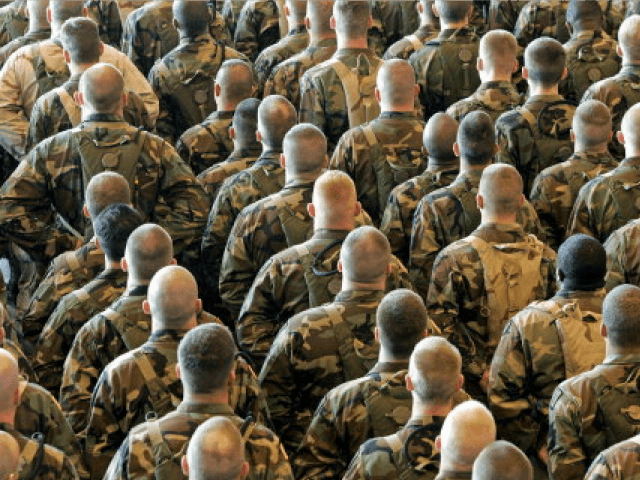WASHINGTON – Chairman of the Joint Chiefs of Staff Marine Gen. Joseph Dunford cautioned against talk of “World War III” after a U.S. military plane shot down a Syrian regime fighter jet over the skies of Syria on Sunday.
“The worst thing that any of us could do right now … would be to address this thing with hyperbole,” Chairman of the Joint Chiefs Marine Gen. Joseph Dunford said during an appearance at the National Press Club in Washington, D.C.
“An incident occurred. We have to work through the incident. We have a channel to be able to do that,” he said.
U.S. tensions with Russia flared on Monday as a U.S. Navy FA-18/E Super Hornet shot down a Syrian Regime SU-22 fighter jet after it dropped bombs near U.S.-backed forces on the ground in Syria on Sunday.
Those forces, known as the Syrian Democratic Forces, are helping the U.S.-led military coalition against the Islamic State (ISIS) in Iraq and Syria recapture the group’s self-proclaimed capital of Raqqa.
The SDF are largely a Kurdish force of 50,000, with a smaller element of Syrian Arab forces, who are helping to retake Raqqa, then hand it over to local government forces and officials. The Syrian regime views the Kurdish forces as a potential threat to the country’s sovereignty.
Russia, which is allied with the Syrian regime and has acted as its intermediary with the U.S., declared on Monday that it would now consider any aircraft west of the Euphrates River in Syria a target and announced it was shutting down a hotline with the U.S. to deconflict its air forces over Syria.
Dunford said the hotline was still “ongoing” as of Monday morning, and there had been communication during the last few hours.
“I, like you, saw in the open source some reporting from Moscow, which I won’t address right now. I will just tell you that we’ll work diplomatically and militarily to reestablish deconfliction,” Dunford said.
But he also said Russia’s intent will be made clear “in the next few hours.”
Dunford said:
The Russian Federation has indicated that their purpose in Syria like ours is to defeat ISIS and we’ll see if that’s true here in the coming hours because all of our operations in and around Raqqa and Southern Syria are designed to get after ISIS and we have agreed in the past that… operations that the coalition was conducting in Syria were effectively degrading ISIS’s capability.
The U.S. military said its shootdown of the Syrian regime plane came after pro-regime forces attacked the SDF and drove them from a town needed to stage the fight for Raqqa.
Coalition aircraft conducted a “show of force” to halt the advance and contacted the Russians through the hotline to get the pro-regime forces to stop. However, later that evening, the Syrian regime aircraft began dropping bombs near the SDF.
“In accordance with rules of engagement and in collective self-defense of Coalition partnered forces,” the plane was “immediately shot down by a U.S. Navy F/A-18E Super Hornet,” according to the U.S.-led coalition.
Dunford said the move was in self-defense and only after taking other actions.
“We made every effort to warn those individuals not to come any closer and the commander made a judgment that there was a threat to the forces that we were supporting and took action,” he said.
“The only actions that we have taken against pro-regime forces in Syria – and there have been two specific incidents – have been in self-defense, and we’ve communicated that clearly.”
The U.S. entered Syria in September 2014 after ISIS swept into Iraq and Syria and threatened to topple Baghdad and gain more territory from the embattled Syrian regime, which had been fighting a civil war since 2011.
Russia entered Syria in 2015, claiming it intended to combat ISIS, but according to U.S. military officials, helped shore up the Syrian regime against anti-regime rebels in its ongoing civil war, instead.
When asked whether he was confident U.S. forces would not be shot down over Syria by the Russians, Dunford responded, “I’m confident that we are still communicating between our operations center and the Russian Federation operations center.”
“And I’m also confident that our forces have the capability to take care of themselves,” he added.
“I think it’s going to require some diplomatic military engagement in the next few hours to restore the deconfliction that we’ve had in place and again the deconfliction that we’ve had in place is in our mutual interest.”

COMMENTS
Please let us know if you're having issues with commenting.